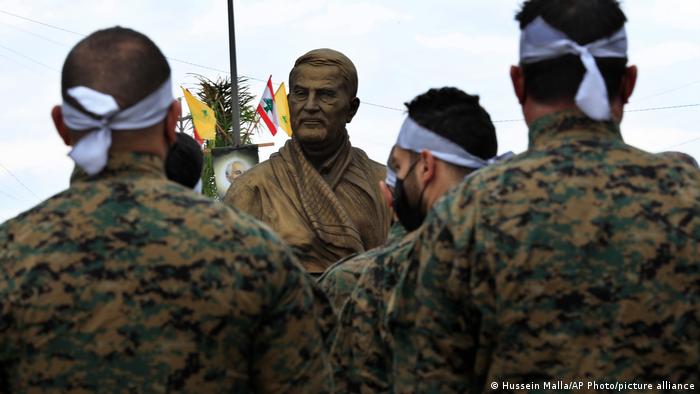
By Najia Houssari -- arabnews.com -- BEIRUT: Unidentified persons hurled a Molotov cocktail at the NewTV station building in Beirut Tuesday morning. Security forces are currently inspecting the station’s surveillance cameras and looking into the incident to prosecute the perpetrators. About a week ago, NewTV broadcast a satirical clip within a weekly political show. The clip referenced the attack on the UNIFIL vehicle in southern Lebanon and the death of an Irish peacekeeper. Hezbollah supporters took offense at the clip and launched a fierce online campaign against NewTV, the station’s news editor Maryam Al-Bassam, the show’s host Dalia Ahmed and comedian Joanna Karaki.
Jawad Hassan Nasrallah, son of Hezbollah’s secretary-general, participated in the campaign. Karaki, who played a southern Lebanese woman, said in the clip that “when the UNIFIL peacekeepers first came to southern Lebanon, they took Lebanese wives, so the majority of southerners now have blue or green eyes with blond hair, with some who look more Italian and British than Lebanese,” referring to intermarriage between residents and peacekeepers operating in the south since 1978. Hezbollah supporters said this clip offends the honor of women in the south of Lebanon. Karaki refused to apologize for what she said, stressing that she is also from the south and is not accusing the women there of doing anything wrong. The incident escalated into a sectarian crisis with the intervention of the Supreme Islamic Shiite Council, which denounced “slander, misinformation and defamation targeting the Shiite Islamic community…under the guise of satirical shows.”

By NAJIA HOUSSARI -- arabnews.com -- BEIRUT: A Lebanese MP has called for action against smugglers who are worsening the economic crises by smuggling already scarce US dollars out of the country to Syria. Hadi Abu Al-Hassan said the smugglers, who are capitalizing on the weak Lebanese pound, were worsening the availability of hard currency and causing “insane” rises in exchange rates. He said that “well-known gangs buy dollars from the local market in frightening quantities and smuggle them into Syria,” and added that the official and black market exchange rates had “risen insanely and without controls” as a consequence. “The bag changers who are present at night on the road to the Al-Masnaa border point are known by name and their destination is Syria. Why do the judiciary and security services not act?
Are these money changers even licensed in the first place?” His comments came as the central bank blamed a sharp devaluation of the Lebanese pound since Christmas on currency speculation and smuggling. The bank devalued the pound to 38,000 to the dollar on Tuesday on the official Sayrafa exchange platform, after it soared to more than 47,000 pounds on the parallel market and at exchange houses.

Story by Gergana Krasteva -- metro.com -- The Life in the UK test may look like your average pub quiz – but instead of a bottle of wine, you are awarded with a citizenship if you pass it. ‘Who built the Tower of London?’, or ‘What did the Chartists campaign for?’, these are just some of the example questions applicants will need to know the answers of, even though, according to Meghan Markle, even Prince Harry struggled with them. Almost 200,000 immigrants took the test in 2022 as part of their applications for citizenship or settlement. According to Home Office figures obtained by Metro.co.uk, more than a third of them failed to reach the minimum score of 75%. The test is intended to prove applicants have ‘sufficient knowledge’ of British life, but those who have been through it described the questions asked as ‘irrelevant’ and ‘outdated’. Hassan Akkad, a BAFTA and Emmy-winning director and producer behind Netflix’s film The Swimmers, arrived in the country as a refugee from Syria in 2015.
After completing the test a year ago, he told us that most of the questions do not prove the level of integration into everyday British life. ‘I am all for testing people who want to live in the UK,’ he stressed. ‘The language test is essential – everyone who wants a citizenship should be able to speak English. Otherwise, they will not have a voice in this society. ‘But the Life in the UK test should test things from everyday life, like for example, how to file taxes, or how to register to vote, or how to register your car. ‘I am not too keen on the historical questions, asking me how many wives Henry VIII had. ‘How is that going to prove the level of integration into everyday British life?’ The test itself costs £50, and cannot to be done in-person, forcing all applicants to also pay for transportation to one of the 30 centres in the country. ‘Did I learn anything useful? No. Literally nothing. Do I think that the government is making big money out of this? Yes,’ he said.

By Sharon Goldman -- venturebeat.com -- These are the 5 biggest AI stories I’m waiting for:
1. GPT-4
ChatGPT is so 2022, don’t you think? The hype around OpenAI’s chatbot “research preview,” released on November 30, has barely peaked, but the noisy speculation around what’s coming next — GPT-4 — is like the sound of millions of Swifties waiting for Taylor’s next album to drop. If expert predictions and OpenAI’s cryptic tweets are correct, early to mid-2023 will be when GPT-4 — with more parameters and trained on more data — makes its debut and “minds will be blown.” It will still be filled with the untrustworthy “plausible BS” of ChatGPT and GPT-3, but it will possibly be multi-modal — able to work with images, text and other data. It has been less than three years since GPT-3 was released, and only two since the first DALL-E research paper was published. When it comes to the pace of innovation for large language models in 2023, many are saying “buckle up.”
2. The EU AI Act
AI technology may be rapidly advancing, but so is AI regulation. While a variety of state-based AI-related bills have been passed in the U.S., it is larger government regulation — in the form of the EU AI Act — that everyone is waiting for. On December 6, the EU AI Act progressed one step towards becoming law then the Council of the EU adopted its amendments to the draft act, opening the door for the European Parliament to “finalize their common position.” The EU AI Act, according to Avi Gesser, partner at Debevoise & Plimpton and co-chair of the firm’s Cybersecurity, Privacy and Artificial Intelligence Practice Group, is attempting to put together a risk-based regime to address the highest-risk outcomes of artificial intelligence. As with the GDPR, it will be an example of a comprehensive European law coming into effect and slowly trickling into various state and sector-specific laws in the U.S., he recently told VentureBeat. Boston Consulting Group calls the EU AI Act “one of the first broad-ranging regulatory frameworks on AI” and expects it to be enacted into law in 2023. Since it will apply whenever business is done with any EU citizen, regardless of location, this will likely affect nearly every enterprise.
3. The battle for search
Last week, the New York Times called ChatGPT a “code red” for Google’s search business. And in mid-December, You.com announced it had opened up its search platform to generative AI apps. Then, on Christmas Eve, You.com debuted YouChat, which it called “Conversational AI with citations and real-time data, right in your search bar.” To me, this all adds up to what could be a real battle for the future of search in 2023 — I’m already munching on popcorn waiting for Google’s next move. As I wrote recently, Google handles billions of searches every single day — so it isn’t going anywhere anytime soon. But perhaps ChatGPT — and even You.com — is just the beginning of new, imaginative thinking around the future of AI and search. And as Alex Kantrowitz told Axios recently, Google may have to make a move: “It’s game time for Google,” he said. “I don’t think it can sit on the sidelines for too long.”
4. Open source vs closed AI
Khazen History


Historical Feature:
Churches and Monasteries of the Khazen family

St. Anthony of Padua Church in Ballouneh
Mar Abda Church in Bakaatit Kanaan
Saint Michael Church in Bkaatouta
Saint Therese Church in Qolayaat
Saint Simeon Stylites (مار سمعان العامودي) Church In Ajaltoun
Virgin Mary Church (سيدة المعونات) in Sheilé
Assumption of Mary Church in Ballouneh
1 - The sword of the Maronite Prince
2 - LES KHAZEN CONSULS DE FRANCE
3 - LES MARONITES & LES KHAZEN
4 - LES MAAN & LES KHAZEN
5 - ORIGINE DE LA FAMILLE
Population Movements to Keserwan - The Khazens and The Maans
ما جاء عن الثورة في المقاطعة الكسروانية
ثورة أهالي كسروان على المشايخ الخوازنة وأسبابها
Origins of the "Prince of Maronite" Title
Growing diversity: the Khazin sheiks and the clergy in the first decades of the 18th century
Historical Members:
Barbar Beik El Khazen [English]
Patriach Toubia Kaiss El Khazen(Biography & Life Part1 Part2) (Arabic)
Patriach Youssef Dargham El Khazen (Cont'd)
Cheikh Bishara Jafal El Khazen
Patriarch Youssef Raji El Khazen
The Martyrs Cheikh Philippe & Cheikh Farid El Khazen
Cheikh Nawfal El Khazen (Consul De France)
Cheikh Hossun El Khazen (Consul De France)
Cheikh Abou-Nawfal El Khazen (Consul De France)
Cheikh Francis Abee Nader & his son Yousef
Cheikh Abou-Kanso El Khazen (Consul De France)
Cheikh Abou Nader El Khazen
Cheikh Chafic El Khazen
Cheikh Keserwan El Khazen
Cheikh Serhal El Khazen [English]
Cheikh Rafiq El Khazen [English]
Cheikh Hanna El Khazen
Cheikha Arzi El Khazen
Marie El Khazen